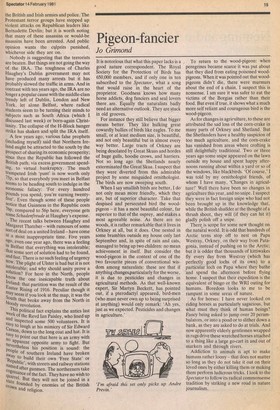Pigeon-fancier
Jo Gnmond
It is notorious that what this paper lacks is a good nature correspondent. The Royal Society for the Protection of Birds has 650000 members, and if only one in ten subscribed to the Spectator, what a song that would raise in the heart of the proprietor. Goodness knows how many horse addicts, dog fanciers and seal lovers there are. Equally the naturalists badly need an alternative outlook. They are s.tuck in old grooves.
For instance they still believe that bigger means better. They like hulking great cowardly bullies of birds like eagles. To me small, or at least medium size, is beautiful, and not only beautiful but in almost every way better. Large tracts of Orkney are being desolated by Great Skuas and hordes of huge gulls, hoodie crows, and harriers. Not so long ago the Shetlands nearly exterminated the Great Skua. I suspect that they were diverted from this admirable project by some misguided ornithologist. The birds are now sweeping south.
When I say smallish birds are better, I do not only mean more friendly, which they are, but of superior character. Take that despised and persecuted bird the woodpigeon — it has a most beautiful colour, far superior to that of the osprey, and makes a most agreeable noise. As there are no woods, it is rather remarkable that it lives in Orkney at all, but it does. One nested in some brambles outside my house only last September and, in spite of rain and cats, managed to bring up two children: no mean achievement in itself. But consider the wood-pigeon in the context of one of the two favourite pieces of conventional wisdom among naturalists: these are that if anything changes,particularly for the worse, it is due to pesticides and changes in agricultural methods. As that well-known expert, Sir Martyn Beckett, has pointed out, if a pterodactyl appeared, bird-men (who must never own up to being surprised at anything) would only remark: `Ah yes, just as we expected. Pesticides and changes in agriculture.' , To return to the wood-pigeon: when peregrines became scarce it was put about that they died from eating poisoned woodpigeons. When it was pointed out that woodpigeons didn't die, there were murmurs about the end of a chain. I suspect this is nonsense. I am sure it was safer to eat the victims of the Borgias rather than their food. But even if true, it shows what a much more self reliant and courageous bird is the wood-pigeon.
As for changes in agriculture, to these are attributed the sad loss of the corn-crake in many parts of Orkney and Shetland. But the Shetlanders have a healthy suspicion of too much agriculture, and the corn-crake has vanished from areas where crofting is still delightfully traditional. Two or three years ago some snipe appeared on the lawn outside my house and spent happy afternoons running about within a yard or so of the windows, like blackbirds. 'Of course,' I was told by my ornithologist friends, of whom I have many, 'Changes in agriculture!' Well there have been no changes in agriculture this year, and no snipe. I suspect they were in fact foreign snipe who had not been brought up in the knowledge that, while the British shudder at the thought of a thrush shoot, they will (if they can hit it) gladly polish off a snipe.
There is scope for some nevi thought on the natural world. It is odd that hundreds of Arctic terns stop off to nest on Papa Westray, Orkney, on their way from Patagonia, instead of pushing on to the Arctic; but it is odder that thousands of kittiwakes fly every day from West ray (which has perfectly good lochs of its own) to a particular loch on Papa where they bathe and spend the afternoon before flying home. I suspect that their expedition is the equivalent of bingo or the WRI outing for humans. Boredom looks to me to be rampant in some areas of nature.
As for horses: I have never looked on riding horses as particularly sagacious, but what must they think of human beings? Fancy being asked to jump over 20 perambulators, or into a pond or to slither down a bank, as they are asked to do at trials. And now apparently elderly gentlemen wrapped in rugs drive these wretched horses attached to a thing like a large go-cart in and out of markers and through rivers.
Addiction to animals is apt to make humans rather loony — that does not matter so long as they do not take it out on their loved ones by either killing them or making them perform ludicrous tricks. I look to the Spectator to follow its radical commonsense tradition by striking a new road in nature journalism.






































 Previous page
Previous page